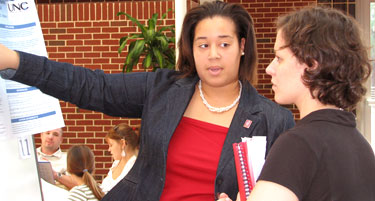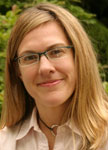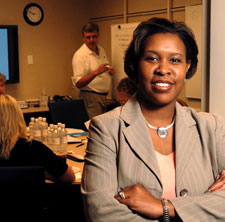| December 13, 2006 | |
 In myriad ways, the UNC School of Public Health is training the next generation of public health leaders who will help explain, intervene and eliminate health disparities. The School’s faculty are training students in key subjects including basic science, biomedical ethics, crisis management, research methodology and substantive public health topic areas. Faculty members facilitate students’ engagement with practical public health work in disadvantaged communities, break down language barriers that impede equal access to care and give graduate students first-hand experience disseminating evidence-based interventions. They also promote diversity within the field of public health in the United States and abroad. Kellogg Health Scholars Program, Community TrackWhen Dr. Stephanie Farquhar came to the UNC School of Public Health on a two-year, postdoctoral fellowship with the Kellogg Community Health Scholars Program, residents of some Eastern North Carolina communities were struggling with the aftermath of Hurricane Floyd. Using the community-based participatory research (CBPR) approach, Farquhar collaborated with survivors to design and conduct a survey on their needs and then to communicate the results to policy makers. The report they produced together led to substantial improvements in flood relief policy. Her work is just one example of the CBPR done by Community Health Scholars and their mentors at the schools of public health at UNC, the University of Michigan and The Johns Hopkins University. 
Dr. Stephanie Farquhar
Of 47 scholars admitted at three schools, 27 are from minority populations (19 African-American, six Latino/Hispanic, and two Asian/Pacific Islander). Scholars have authored or co-authored more than 179 publications. Now known as the Community Track of the Kellogg Health Scholars Program, the fellowship is in its ninth year of training a new cadre of public health faculty. Alumni leave the program with skills needed to build the capacity of communities, health agencies and academic centers such that these entities then function as equal partners in research, practice and education. Alumni from the program now hold faculty positions in 20 academic institutions and professional positions in four health agencies and institutions, an important measure of success. Virtually all the research carried out by Community Health Scholars addresses issues of health disparities, and all their investigations follow the principles and guidelines of CBPR. Topics include youth violence, smoking, environmental justice, diabetes, cardiovascular disease, women’s health, mental health, obesity, sexual health, air quality, bilingual training of health workers, hypertension among African-American men, genetics and disparities, stress, cancer and substance abuse. Scholars who choose the UNC site work closely with faculty mentors and community mentors affiliated with African-American and Latino community-based coalitions. Dr. Eugenia Eng, professor of health behavior and health education at the School, directs the fellowship program at UNC and builds working relationships among academics, community members and public health practitioners. These research partnerships benefit under-served communities. They also develop a group of health leaders with the skills to eliminate health disparities. W. K. Kellogg Foundation funds the fellowship program. Strengthening Bioethics Capacity and Justice in HealthEthical challenges often arise in the conduct of biomedical research in developing countries from the very same social, economic and political conditions that contribute to poor health outcomes. War, poverty, oppression, the infringement of basic human rights — all may have a powerful impact on health, affect some groups more than others, and may make it difficult to realize the goal of improving public health while protecting and benefiting individuals and communities. Yet until recently, there were few programs to train professionals from the developing world in research ethics that take such inequalities and injustices into account. Dr. Frieda Behets, associate professor of epidemiology at the UNC School of Public Health, in collaboration with Dr. Stuart Rennie, research assistant professor in the UNC School of Dentistry, Dr. Gail Henderson, professor of social medicine at the UNC School of Medicine, and colleagues from Kinshasa and Belgium, are helping to expand bioethical capacity and training at the University of Kinshasa School of Public Health in the Democratic Republic of Congo. Through their project, Strengthening Bioethics Capacity and Justice in Health, funded by the National Institutes of Health’s Fogarty International Center, Congolese scholars complete intensive master-level training in bioethics at the Catholic University of Louvain in Belgium and then spend up to six months with mentors at UNC. While in Chapel Hill, scholars complete Institutional Review Board (IRB) training, develop curricula and training modules around bioethics issues in the developing world and strengthen their capacity for independent research. When they return to the new Center of Bioethics at the Kinshasa School of Public Health, they will strengthen ethical review of the IRB there and promote creative, responsible, culturally resonant solutions to bioethical conflicts. Teaching materials the scholars develop at Carolina will be integrated into the Master’s of Public Health program at Kinshasa. Impact of their training will spread even further in 2008, when the center will offer a two-week intensive course in bioethics for medical professionals from throughout French-speaking African countries. This course is unlike any other and represents a unique partnership between the UNC School of Public Health and the University of Kinshasa. Emerging Leaders in Public Health
Mekeisha Williams
As president of Communidades Latinas Unidas En Servicio, Minnesota’s premier Latino social and behavioral health services provider, Jesse Bethke Gomez, helps improve the health of that state’s Latino population. Gomez has spearheaded two major health assessments, including one on health disparities. He promotes healthcare access for Latinos and serves on a citizens’ panel charged with identifying solutions to the growing cost of healthcare. Gomez is just one of the professionals putting into practice the high-level leadership and crisis management skills he honed in the Emerging Leaders in Public Health (ELPH) program, which the N.C. Institute for Public Health at the UNC School of Public Health leads in partnership with the UNC Kenan-Flagler School of Business. Gomez’s fellow ELPH alumni include African-Americans, American Indians, Asian Americans and other Latino Americans–members of some of the minority groups under-represented in public health leadership. The two-year-old ELPH program promotes diversity among the next generation of public health leaders by identifying talented individuals and training them to manage in turbulent times through an intensive nine-month program of onsite workshops and distance education. Mekeisha Williams is the director of the Emerging Leaders in Public Health Fellowship, which is funded by the W. K. Kellogg Foundation. Carolina-Shaw Partnership for the Elimination of Health DisparitiesThis partnership between UNC and Shaw University, a historically Black university, is working to eliminate differences in minority health care and status on several levels. One of the most important aspects of the center’s work is in establishing research resources and improving research infrastructure at Shaw so that more African-American college students can become health researchers. The center is also training new investigators at both institutions in health disparities research methodology, and collaborating on a church-based community outreach project. The partnership has additionally created the health disparities curriculum at UNC and another at Shaw, awarded pilot funds to junior faculty at UNC and historically Black colleges and universities in North Carolina, and spurred intense inter-university faculty collaboration. “The structure of the partnership maximizes the exchange of scientific and programmatic activity between UNC, Shaw University, and the North Carolina Office of Minority Health and Health Disparities,” says Dr. Daniel Howard, the partnership’s co-director. Howard is professor of health policy and director of the Institute for Health, Social, and Community Research at Shaw University in Raleigh, N.C. Funded by the National Institutes of Health, National Center on Minority Health and Health Disparities, the partnership is directed by Dr. Paul Godley, adjunct associate professor of epidemiology and biostatistics at the UNC School of Public Health and professor of hematology and oncology at the UNC School of Medicine. Dr. Timothy Carey is the partnership’s deputy director. Carey directs the UNC Cecil G. Sheps Center for Health Services Research and is clinical professor of epidemiology in the UNC School of Public Health and professor of medicine in the UNC School of Medicine. Interdisciplinary Certificate in Health DisparitiesThe Interdisciplinary Certificate in Health Disparities, an integrated program of courses and seminars at the UNC School of Public Health, trains health professionals to assess disparities, conduct basic science on contributing factors, measure access to care, evaluate the role of race and racism in health, and develop and evaluate interventions designed to reduce health disparities. The certificate program is part of ECHO, the UNC Program on Ethnicity, Culture and Health Outcomes, a joint program of the Schools of Public Health and Medicine. The health disparities curriculum, on which the certificate program is based, originally was developed through a grant from the Commonwealth Foundation and the Public Health Leadership Program. The curriculum is directed by Dr. Vijaya Hogan, clinical associate professor of maternal and child health in the UNC School of Public Health and adjunct associate professor of obstetrics and gynecology in the UNC School of Medicine. Hogan and Dr. Anissa Vines, research assistant professor of epidemiology at the School and associate director of ECHO, co-direct the certificate program. Students in ActionEven as they pursue their degrees, undergraduate and graduate students at the UNC School of Public Health are doing practical public health work in communities in the United States and abroad. Through the Action-Oriented Community Diagnosis class, student teams get real-world experience with communities and service providers and learn to analyze the social determinants of health. In this class and in many other ways, public health professionals still in training at the School are putting their education — and their passion — to work on community health issues, and they’re broadening their knowledge at the same time. Here are a few examples:
— by Kathleen Kearns # # # Carolina Public Health is a publication of the University of North Carolina at Chapel Hill School of Public Health. To subscribe to Carolina Public Health or to view the entire Fall 2007 issue in PDF, visit www.sph.unc.edu/cph. |
|
